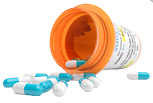MRSA, miracle drugs and mighty mutations
 When they were first discovered and used for treating infections in the 1940’s, antibiotic drugs were hailed as “miracle drugs”. And they were! They saved countless lives, and thank goodness we had them. Because antibiotics worked so well, doctors began prescribing them heavily instead of the natural treatment methods that were more common at the time.
When they were first discovered and used for treating infections in the 1940’s, antibiotic drugs were hailed as “miracle drugs”. And they were! They saved countless lives, and thank goodness we had them. Because antibiotics worked so well, doctors began prescribing them heavily instead of the natural treatment methods that were more common at the time.
Within the first couple years, bacteria mutated and began to learn how to resist these drugs. They started “fighting back” and became immune to the very drugs created to kill them. Thus the problem of antibiotic resistance was borne.
You may wonder how bacteria could learn to survive being subjected to antibiotics? Let me tell you something. Did you know there are bacteria that literally eat antibiotics? That’s right, these antibiotic eating superbug bacteria have been shown to thrive on antibiotics alone. If that’s not enough, researchers have found strains of bacteria that are feeding off of radioactive waste!
Bacteria are supreme problem solvers
I used to test bacteria for antibiotic resistance when I worked in the pharmaceutical industry. If there’s one thing I learned about bacteria like MRSA and Staph, it’s that they are perfectly adapted to survive. They may be small, and they may have no brain, but bacteria are super intelligent when it comes to survival, especially surviving against antibiotics. And the more antibiotics are used, the quicker bacteria learn to become resistant to them.
Even though antibiotics are becoming less effective, doctors world-wide keep prescribing them like candy. And the livestock industry uses more antibiotics than all the medical uses combined. It’s no wonder with the abuse and overuse of antibiotics, less and less of them are working each year against Staph, MRSA and other infections.
Now as much as I prefer natural MRSA treatments, I still believe there’s a time and place for antibiotics for Staph and MRSA, despite their many side effects. But these important drugs are going to become useless unless we learn how to use them wisely and only use them when they’re needed.
You can help keep antibiotics effective
I think it’s wise that everyone only use antibiotics as a back-up option. For infections that are not life threatening, why not use safe and effective natural MRSA treatments before resorting to drugs that have so many negative side effects? Antibiotics are most valuable when the body is clearly not winning the battle against an advanced infection. Antibiotics might become necessary and can even be life-saving, but there are many safe and effective natural alternatives you can try first.
And, remember, antibiotics are only meant to work against bacteria. If you have a cold or flu, do not ask your doctor for antibiotics, as they will not help you get better.
Tips on using antibiotics wisely
First of all, if you’re going to take an antibiotic, then take the right one. If you think you have MRSA, then get a MRSA culture test. Doctors routinely prescribe “standard protocol” broad spectrum antibiotics for infections. These drugs are often useless against MRSA and some Staph and they needlessly weaken your immune system, making you more prone to re-infection. A positive MRSA test tells your doctor that a more specialized antibiotic is needed, shortening the list of possible antibiotics to prescribe.
And if you’ve taken many different antibiotics and they stop working, then get microbial susceptibility or sensitivity test. This test can pinpoint which exact antibiotic will work best for your particular infection.
Second, be sure to use your antibiotics correctly. Insist that your doctor show you the side effects and what things you should avoid with the antibiotic. You’ll find all this spelled out on the Product Insert, not on your prescription label. Also make sure you take the full course and never stop taking an antibiotic before the prescription runs out (unless you are having a negative reaction to it, of course). If you don’t take the full course of antibiotics, it’s much easier for the bacteria to become resistant to the antibiotic.
Lastly, if you’re taking antibiotics, you better be managing the side effects. The common side effects of stomach ache, skin reactions, dehydration and yeast infections can be controlled using specific natural methods. And, one of the biggest problems with antibiotics is that they weaken your immune system. Antibiotics are especially destructive to the “good” bacteria living in your gut that protect you from infections. There are many helpful steps you can take to help boost your immune system like replenishing the “good” bacteria.
The right tool for the right job
Antibiotics are powerful drugs that have a proper time and place. To get the best results from these drugs, you should understand the pros and cons of antibiotics and know how to use them properly and wisely. If you’re stuck in the vicious cycle of taking one useless antibiotic after another, then understanding antibiotics and working with your doctor to ensure that you get the right tests will give you the most benefit from these drugs.
And remember, ask your doctor if antibiotics are necessary for your infection. If your infection is not serious, try the many natural antibiotics and MRSA natural remedies available so you can lessen your chances of getting a more antibiotic-resistant infection. Many doctors are becoming more open to “alternative” strategies, with the rise of antibiotic resistance.
To your health,
Michelle Moore
Microbiologist and Natural Health Expert
Author of the Natural MRSA Treatment Guidebook MRSA Secrets Revealed




